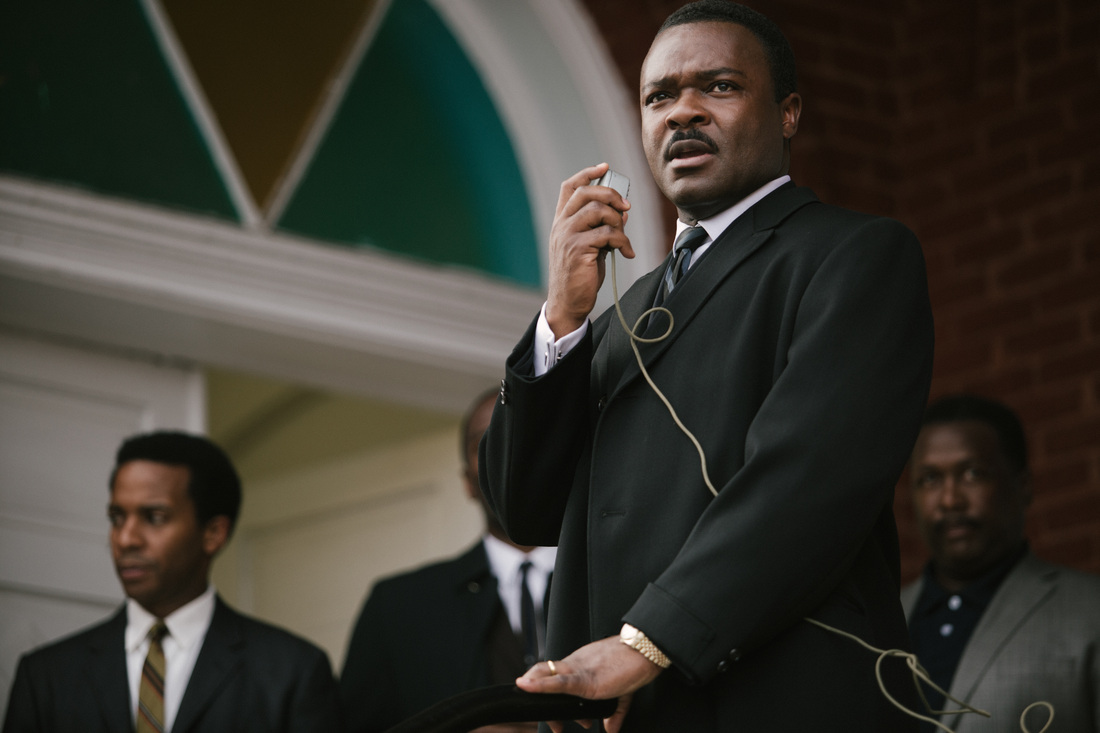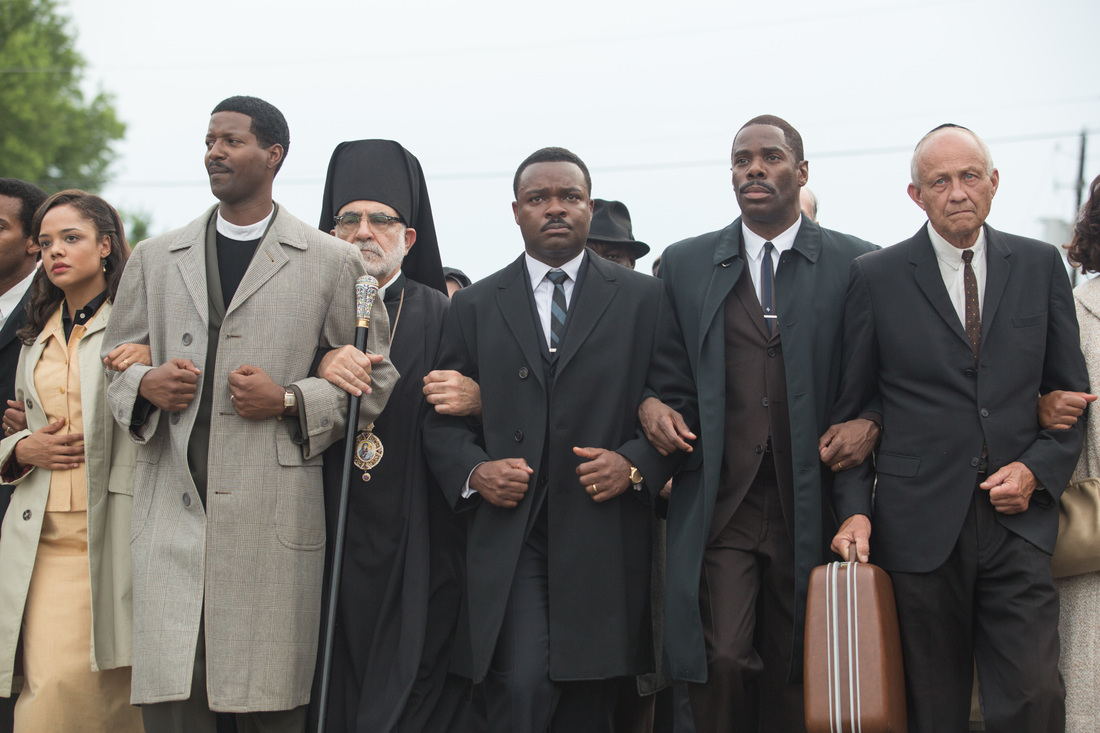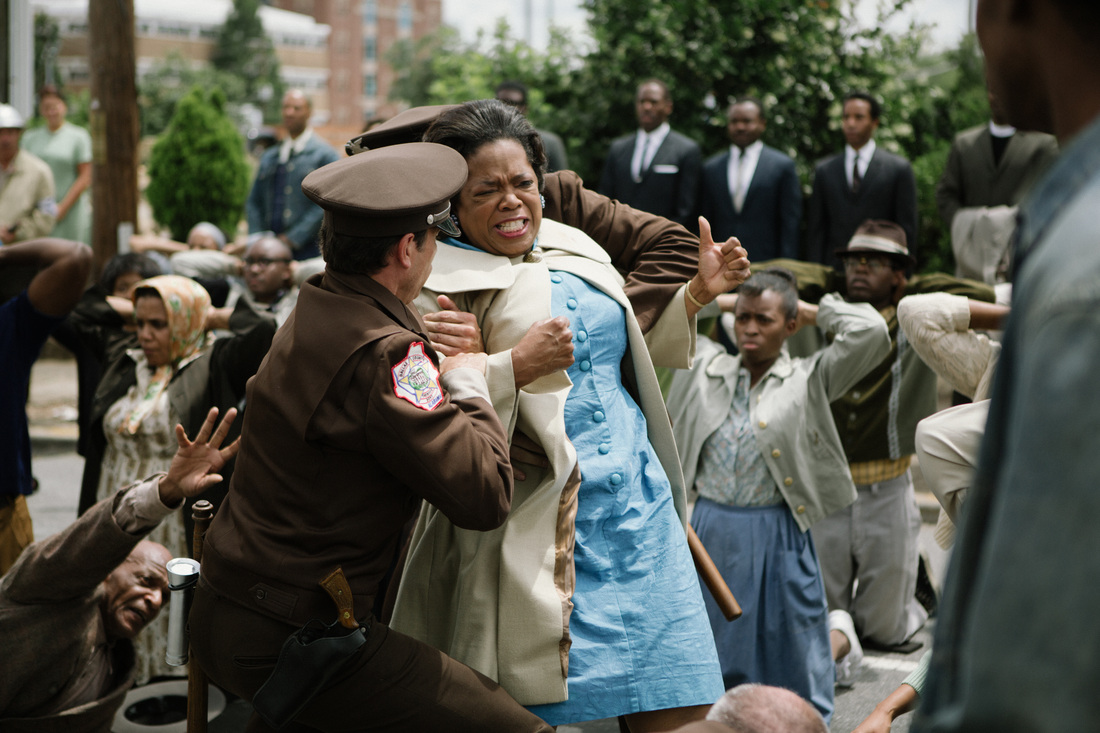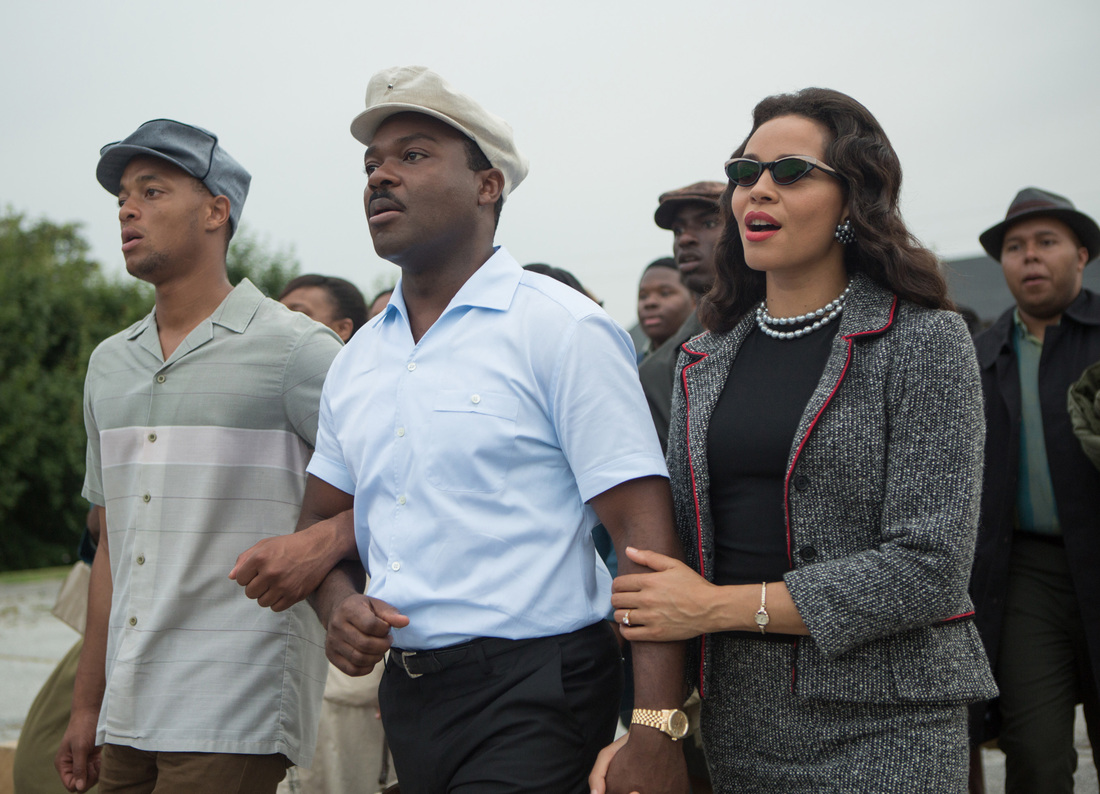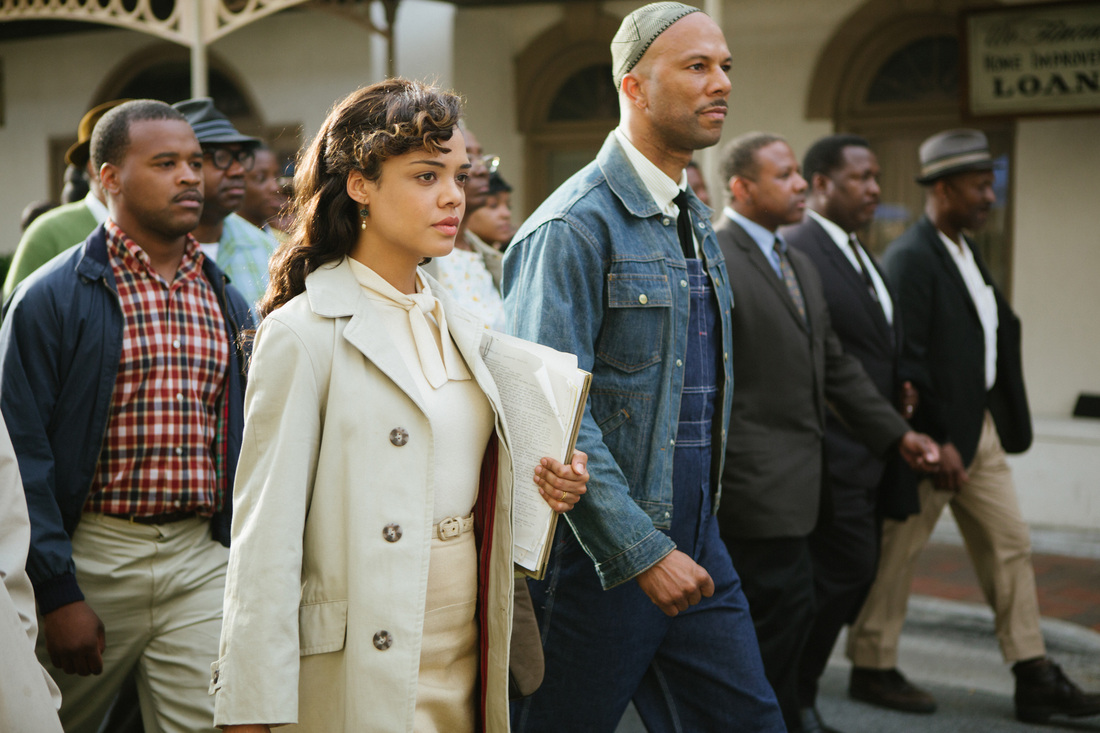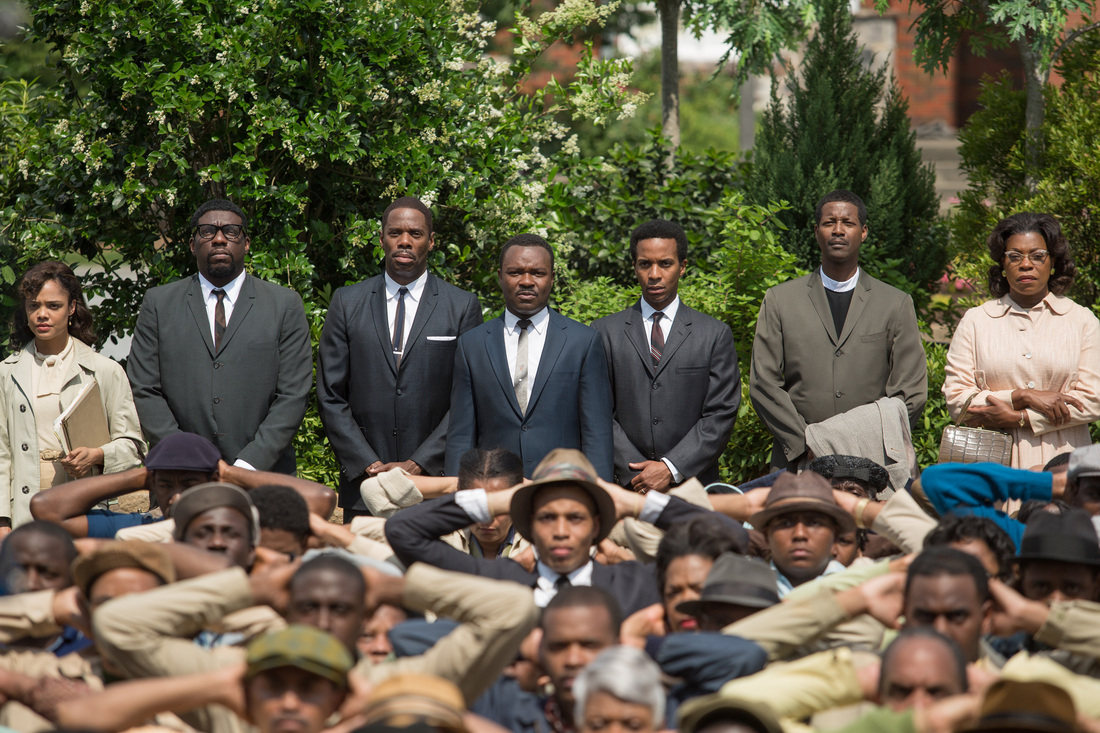|
How entertaining? ★★★★★
Thought provoking? ★★★★☆ 24 December 2014
This article is a review of SELMA. |
“People are dying in the street Mr President; it can’t wait,” Martin Luther King Jr. (David Oyelowo) to Lyndon B. Johnson (Tom Wilkinson)
The silences between sentences, as Coretta Scott King (Carmen Ejogo) confronts husband Martin Luther King (Oyelowo) over his infidelities, is a scene showing how high SELMA holds its audience. Marital tension is adroitly handled, almost arthouse in its ellipses, and then also humanising the civil rights leader without robbing him of his legend. Bland hagiography could easily have been the modus operandi; rather the filmmakers have reached for an almost Ken Loach-ian political layering.
Eschewing biopic cliché – that tired birth to death life story that cannot help but be superficial – SELMA is focused on less than a year in time. Not one, but two opening segments grab the attention:
- 1964, Martin Luther King collects the Nobel Peace Prize in Oslo, Norway.
- Children conversing in a church are cut short by a bomb blast killing four of them.
Civility and brutality are juxtaposed, as are emotional outrage and an intellectual dissection of peaceful protest.
The silences between sentences, as Coretta Scott King (Carmen Ejogo) confronts husband Martin Luther King (Oyelowo) over his infidelities, is a scene showing how high SELMA holds its audience. Marital tension is adroitly handled, almost arthouse in its ellipses, and then also humanising the civil rights leader without robbing him of his legend. Bland hagiography could easily have been the modus operandi; rather the filmmakers have reached for an almost Ken Loach-ian political layering.
Eschewing biopic cliché – that tired birth to death life story that cannot help but be superficial – SELMA is focused on less than a year in time. Not one, but two opening segments grab the attention:
- 1964, Martin Luther King collects the Nobel Peace Prize in Oslo, Norway.
- Children conversing in a church are cut short by a bomb blast killing four of them.
Civility and brutality are juxtaposed, as are emotional outrage and an intellectual dissection of peaceful protest.
|
|
|
“Non-violence is not passive, it is very strong,” Reverend Hosea Williams (Wendell Pierce)
Director Ava DuVernay and writer Paul Webb match GANDHI and CRY FREEDOM for potent non-violent revolution portrayal. Negotiating for legal change has a LINCOLN attention to detail. Calling King’s awards trinkets, President Johnson, even with a landmark landslide election victory, is slightly jealous at the civilian campaigner. Choice words mark out Johnson for a faux-liberal, yet his sympathy for minority injustice is also matched by a slight that the laws on his watch go flouted. Like the Kings, Johnson is given complexity. Presidential legacy nags at him.
Alabama is preventing the African-American population from the right to vote. State sanctioned police sadism meet dignified marches. One such parade disruption culminates in a heartbreaking murder of a civilian by an officer in a restaurant; a scene soaked in tension. “How many other fingers were on that trigger?” M.L.K.
Focusing on the march from Selma to the state capital, Montgomery, in 1965, is the brilliant narrative choice: Stepping away from big era arcs, and homing in on key months used to illustrate the wider whole. No audience member is left behind, and without being patronised, F.B.I. eavesdropping results are typed out along the bottom of the screen, having two purposes: 1. Succinctly setting the scene, and 2. Reminding how troubling lack of privacy is, especially in a time of extreme injustice when the authorities lack empathy. “They are going to ruin me, so they can ruin the movement,” King observes.
Spot on casting goes beyond Oyelowo, Ejogo and Wilkinson:
- Martin Sheen brings formidableness to judge Frank Minis Johnson.
- Tim Roth chews the scenery, bypassing hamminess, as slickly villainous Governor George Wallace.
- Dylan Baker gives his J. Edgar Hoover a slimy distastefulness.
- Cuba Gooding Jr. (playing Fred Gray) has been quietly growing gravitas.
But it is Oprah Winfrey, shorn of glamour, as Annie Lee Cooper, who grabs, channelling her celebrity skilfully.
SELMA is an exhilarating take on Martin Luther King, sagely focused in history but wide in commentary.
We have selected movies below that we think will be of interest to you based on this review.
Using these Amazon affiliated links help us keep Filmaluation free for all film and arts lovers.
Amazon UK
|
|
|
|
|
Amazon USA
|
|
|
|
|


